一般过去时课件PPT
一般过去时学习ppt课件
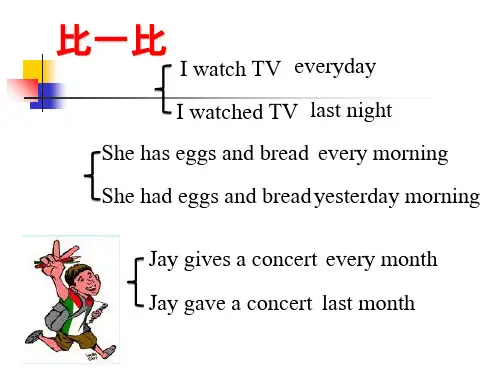
Lucy __d_id_n_’_t_ ___d_o___ her homework at home. 2、He found some meat in the fridge.(变一般疑问句)
__D_i_d__ he __f_in_d_ ___a_n_y_ meat in the fridge? 3、She stayed there for a week.(对划线部分提问)
2、His father worked all day last Monday.(改一般疑问句) __D_i_d__his father ___w_o_r_k__ all day last Monday?
3、 I was very busy last week. (改否定句和一般疑问句) I __w__as_n_’_t_ very busy last week. _W__er_e_ you very busy last week?
2. 结尾是 e 的动词加 -d
3. 末尾只有一个辅音字母的重读 闭音节词,先双写这个辅音字 母,再加-ed
look play start live hope use
stop plan trip
looked played started lived hoped used
stopped planned tripped
/t/ /d/ 之后念 /id/ , 即 ed 在 /t/ /d/ 音后面念 /id/
例:wanted shouted needed counted
“雪亮工程"是以区(县)、乡(镇) 、村( 社区) 三级综 治中心 为指挥 平台、 以综治 信息化 为支撑 、以网 格化管 理为基 础、以 公共安 全视频 监控联 网应用 为重点 的“群 众性治 安防控 工程” 。
一般过去时讲解PPT课件
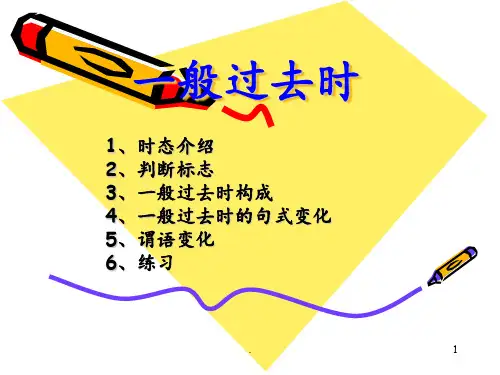
Yes,you did.
Yes,I did. Yes,he/she/it did.
No,you did not. No, I did not. No,he/she/it did not.
work Did we work?
Did you work? Did they work?
Yes,we/you did. Yes,we did. Yes,they did.
grow -- grew know -- knew throw -- threw blow -- blew write -- wrote drive -- drove ride -- rode get -- got forget -- forgot lend -- lent send -- sent spend -- spent say -- said */sed/ pay -- paid stand -- stood understand -- understood let -- let put -- put cut -- cut read -- read2*0
.
1
1.定义:
(用法一) 一般过去时态表示过去某个时间发生的动 作或存在的状态,常和表示过去的时间状语连用;
eg:I got up at 7:00 yesterday.
My father was at work yesterday afternoon
(用法二) 也表示过去经常或反复发生的动作,常和 表示频度的时间状语连用。
写出下列动词的过去式:
go
went
use
think thought live
be
was/ were wake
happen happened keep
一般过去时课件(PPT)课件
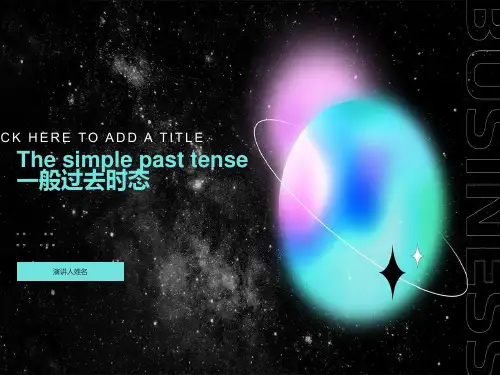
用动词的适当时态填空
____ you ________ (remember) to buy the oranges yesterday? 2.Who ________ (play) computer games yesterday. 3.We _____ (go) to the cinema last night. The film _____ (be) very good. 4.What time ____ you ____ (get) to school this morning? 5.Jim ___ (do) a lot yesterday. He ____ (go) shopping and ______ (cook) supper.
lived
ate
had
made
played
cooked
Did
规则变化 1.一般加ed
2.以e结尾加d
3.末尾只有一个辅音字母的重读闭音节词,先双写这个辅音字母,再加ed .
work —
worked
change —
changed
prefer —
preferred
stop —
stopped
study —
didn’t do
Did
find any
How long did
stay
Was
any
Thank you
CLICK HERE TO ADD A TITLE
单击此处添加文本具体内容
演讲人姓名
do/ does
didn’t
did
didn’t watch
一般过去时课件(PPT)
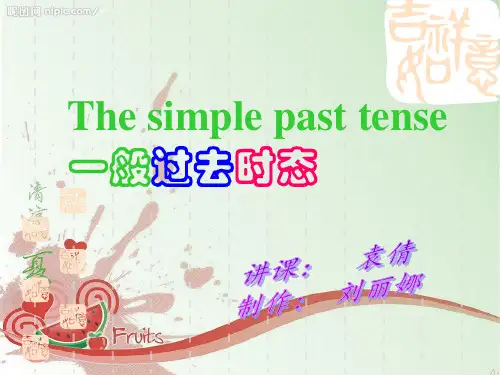
B pictures in the park 1.I ___
Exercises
last weekend. A.take B.took C.was D.draw
A 2. Did you ___football yesterday. A. play B. played C. were D. are
A 3.He always _____me last term. A. helped B. helps C. helping D. help 4.Where did you ___last B Monday? A.went B.go C.do D.did
climbed a mountain
mped
fly kites read a book sing and dance eat good food
swim do am/is are study
flew kites read a book sang and danced ate good food
6. He usually gets ____ (get) up at 6 getting in the morning. Look! He is ______ (get) up now. But yesterday he got (get) up very late, so he ____ went (go) to school late. He was ____ ___ (be) late for school.
动词原形、第三人称单数 动词过去式
They don’t watch TV in the evening. didn’t watch TV last night. They _________
She doesn’t play basketball after school. She _________ didn’t play basketball after school yesterday. Do you go to school on foot every day? go to school on foot yesterday. ___ Did you __ Does he go to school by bus every day?
一般过去时(课件)
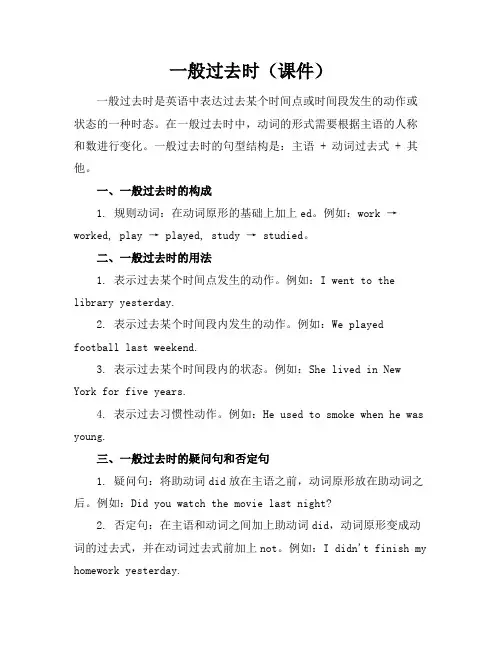
一般过去时(课件)一般过去时是英语中表达过去某个时间点或时间段发生的动作或状态的一种时态。
在一般过去时中,动词的形式需要根据主语的人称和数进行变化。
一般过去时的句型结构是:主语 + 动词过去式 + 其他。
一、一般过去时的构成1. 规则动词:在动词原形的基础上加上ed。
例如:work → worked, play → played, study → studied。
二、一般过去时的用法1. 表示过去某个时间点发生的动作。
例如:I went to the library yesterday.2. 表示过去某个时间段内发生的动作。
例如:We playedfootball last weekend.3. 表示过去某个时间段内的状态。
例如:She lived in New York for five years.4. 表示过去习惯性动作。
例如:He used to smoke when he was young.三、一般过去时的疑问句和否定句1. 疑问句:将助动词did放在主语之前,动词原形放在助动词之后。
例如:Did you watch the movie last night?2. 否定句:在主语和动词之间加上助动词did,动词原形变成动词的过去式,并在动词过去式前加上not。
例如:I didn't finish my homework yesterday.四、一般过去时的特殊用法1. 过去进行时:表示过去某个时间点正在进行的动作。
例如:What were you doing at 8 o'clock last night?2. 过去完成时:表示在过去某个时间点之前已经完成的动作。
例如:I had finished my work before he came.3. 过去完成进行时:表示在过去某个时间点之前一直在进行的动作。
例如:She had been waiting for two hours when he finally arrived.一般过去时(课件)一般过去时是英语中表达过去某个时间点或时间段发生的动作或状态的一种时态。
一般过去时讲解课件(共19张PPT).ppt
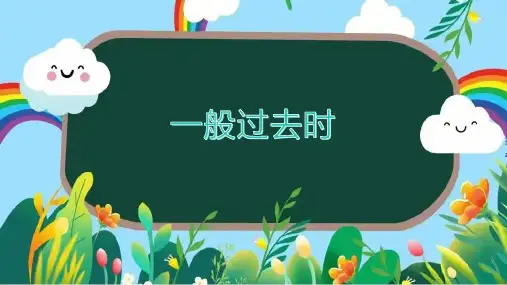
否定句
1) 主语+wasn’t/weren’t+表语
He wasn’t a student ten years ago.
2) 主语+didn’t+动词原形+其他
They didn’t have a good time last night.
4.一般过去时的结构
一般疑问句
was为单数; were为复数
一般过去时的结构
4.一般过去时的结构
was为单数; were为复数
肯定句
1) 主语+was/were+表语
He was a student ten years ago.
2) 主语+动词过去式+其他
They had a good time last night.
4.一般过去时的结构
was为单数; were为复数
时间+ago类 in+年份类
yesterday morning;yesterday.... last night; last week...
two days ago in 2023
动词过去式的变化
3.动词过去式的变化 1.直接加ed work--worked look--looked 2.不发音的e结尾,去e加ed hope--hoped like--liked 3.重读的闭音节词,双协结尾字母加ed stop--stopped plan--planned 4.以辅音字母加y结尾,变y为i再加ed study--studied try--tried 5.不规则变化
What did they do last night?
总结与练习
5.总结与练习
一般过去时 1.定义:表示一个过去发生的动作或表示过去存在的状 态 2.标志词:yesterday,last...,....ago, just now..... 3.动词的过去式变化 4.一般过去时的各种句型:
一般过去时(共22张PPT)
Finish Part C on page 62.
Millie: We _____ went (go) to the Fun World Museum the day before yesterday, Daniel. It ____ was (be) so interesting! Daniel: Really? Tell me all about it. Millie: OK. We ____ saw (see) a small monkey, only 11 centimetres tall. Daniel: That’s amazing! What else? Millie: We also _____ learnt (learn) about some strange birds like dodos. They _____ lived (live) on the earth a long time ago. Daniel: That’s cool!
一般过去时的否定句 (1)be动词的否定句
I/He/She/It You/We/They
was
were was not were not at home yeou/We/They
at home yesterday.
一般过去时的否定句
(1)be动词的否定句
1.Alice was outside one sunny day. Alice wasn't outside one sunny day. 2.Mary was at home yesterday. Mary wasn't at home yesterday. 3.We were in Beijing last week. We weren't in Beijing last week.
一般过去时PPT课件
动词过去式转换练习 答 案
1. look looked 2. live lived 3. stop stopped 4. carry carried 5. hope hoped 6. trip tripped 7. call called 8. finish finished 9. want wanted 10.are were 11.go went 12.have had 13.do did 14.get got e came 16.say said 17.see saw 18.put put 19.eat ate 20.take took 21.read read
一般过去时态练习 用动词的过去式填空
一般过去时态练习 用动词的过去式填空
1. He usually gets up early in the morning. But______________________late today. 2. She usually works from 8 a.m. to 5 p.m. But yesterday __________________________ 3. _____________________ on Sundays. They went to the park last Monday. 4. _____________________at breakfast. But yesterday he didn’t read the newspaper.
stop trip
stopped tripped
结尾是“辅音字母+y”的动词,先变“y”为“ i”再加-ed
study worry
studied worried
规则动词过去式词尾-ed的读音
一般过去时课件(PPT)
claDssidroom last PE lesson.
•6. My mother _______ (cook) a nice
food last Spring Festival.
• 7.____ 2020/10/28 she go to work by bike? Yes, she
一般过去时的谓语构成:由动词 的过去式构成
Does he go to school by bus every day?
don’t/ doesn’t do/ does 2020/10/28
didn’t did
•一、用行为动词的适当形式填 空
•
•1. He ago.
__l_i_v_e_da__t_e(live)
in
Wuxi
two
years
• 2. • 3.
other last month. • 4. Helen and
Nancy
__a_r_e____
good
friends.
is
• 5. The little dog _____ two years old
this year.
are
• 6. Look, there ________ lots of
grapes here.
She doesn’t play basketball after school. She _d_id_n_’t__pl_a_y_ basketball after school yesterday. Do you go to school on foot every day? _D_id_ you _g_o to school on foot yesterday.
他们昨天在日本。 They _w_e_re_ in Japan yesterday.
一般过去时的讲解ppt课件完整版
助动词did的用法
在一般过去时中,助 动词“did”用于构 成疑问句和否定句。
在回答一般过去时的 疑问句时,可以用 “did”的相应形式 进行回答。
“did”后面跟动词 原形,表示过去某个 时间发生的动作或状 态。
一般过去时的否定句和疑问句
否定句
在动词前加“didn’t”,后面跟动词原形,表示过去某个时间没有发生的动 作或状态。例如:“I didn’t go to the park yesterday.”(昨天我没有去公 园。)
陈述句改疑问句
指导学生将一般过去时的 陈述句改写为疑问句,注 意语序的调整和助动词 did的使用。
特殊疑问句的回答
给出特殊疑问句及其回答 ,让学生熟悉一般过去时 特殊疑问句的构成和回答 方式。
阅读理解中一般过去时的识别与运用
阅读文章并回答问题
提供一篇含有一般过去时的文章,让学生阅读后回答与文章内容 相关的问题。
疑问句
将助动词“did”放在主语前构成疑问句,表示询问过去某个时间是否发生了某 个动作或状态。例如:“Did you go to the park yesterday?”(昨天你去公 园了吗?)
04
一般过去时的重点与难点
BIG DATA EMPOWERS TO CREATE A NEW
ERA
不规则动词的过去式
识别一般过去时的标志词
列出一般过去时的常见标志词,如yesterday, last week等,让学 生在阅读过程中识别并标注出来。
运用一般过去时描述事件
要求学生运用一般过去时描述一个发生在过去的事件,注意动词过 去式的正确使用和句子结构的完整性。
THANKS
感谢观看
1 2
- 1、下载文档前请自行甄别文档内容的完整性,平台不提供额外的编辑、内容补充、找答案等附加服务。
- 2、"仅部分预览"的文档,不可在线预览部分如存在完整性等问题,可反馈申请退款(可完整预览的文档不适用该条件!)。
- 3、如文档侵犯您的权益,请联系客服反馈,我们会尽快为您处理(人工客服工作时间:9:00-18:30)。
动词的一般过去时态表示过去发生的 动作、情况或存在的状态。 行为动词(即实义动词)的过去式没有人称 和数的变化。
所有时态都是通过
动词
变化来表现的
Please look at the sentences
我今年12岁. am 12 years old this year. I ___ 我去年11岁. was 11 years old last year. I ____ 他现在在北京。 is in Beijing now. He ____ 他昨天在上海。 was in Shanghai yesterday. He ____
3.与yesterday 连用
4.与one 连用:one day
5.与that 连用:that year
6.其他时间状语:just now
否定句式:a ,was\ were+not b, didn’t +v.原 一般疑问句:a, was\were 在句首 b, did 在句首,注意还原行为动词。 C, there be 句型 Be there…
用于一般过去时的时间状语
1.与ago 连用: a moment ago
2.与last 连用: last night
用法
3.表示已故人所做的事情。
Comrade Lei Feng did good deeds in his life. 雷锋同志做了一生的好事。
4.如果强调已经终止的习惯时要用 used to do I used to run at night.
过去时的句式 结构有哪些? 肯定句式:主语+过去动词+其他
has fruit every day. He _____ had He _____ 3 apples yesterday.
have/ has had 动词原形、第三人称单数
动词过去式
They don’t watch TV in the evening. didn’t watch TV last night. They _________
谓语构成
一般过去时的谓语构成:由动词 的过去式构成(参看书本)
规则变化
1.一般加ed work — worked 2.以e结尾加d change — changed 3.末尾只有一个辅音字母的重读闭 音节词,先双写这个辅音字母,再 加ed . stop — stopped
prefer — ห้องสมุดไป่ตู้referred
4.以辅音字母加y 结尾的词,先 改 y为 i,再加ed
study — studied 5.不规则变化.
规则动词过去式-ed的发音
1.在以清辅音结尾的规则动词后, -ed读作/ t / worked 2.在以浊辅音或元音结尾的规则动词后, -ed读作/d /
/w3:k/ t/
ed live /lIv d //
play ed /pleI d //
3.在以/t/或/d/结尾的规则动词后, -ed读作/Id /
visit ed /’vIzIt I / d/
finished /t/ enjoyed /d/ shouted /Id/ moved /d/ helped wanted called needed /t/ /Id/ /d/ /Id/
don’t/ doesn’t do/ does
didn’t did
was , were 1.动词 be had 2.动词 have, has 3.助动词do, does did 4.行为动词用过去式 一般过去时以动词的过去式来表示, 没有人称和数的变化.(was,were除外) I went to school yesterday. They went to school yesterday.
写出下列动词的过去式
1. look
2. live
3. stop 4. go
5. hope
6. trip 7. call 8. eat 9. want 10. are
looked lived stopped went hoped tripped called ate wanted were
11. fly 12. have 13. do 14.get 15. come 16. say 17.see 18. put
他们今天在中国。 are in China today. They ____
他们昨天在日本。
were in Japan yesterday. They ____
am/ is are
was were
I have ____ eggs and milk for breakfast every morning. had noodles for breakfast I ____ yesterday morning.
flew has did got came said saw put
完成书上P16 (一)
1.在过去某一时间内发生的动作: He got home at ten o’clock last night. 2.表示过去经常或反复发生的动作, 常与often,always等表示频度的 间状语连用: I often got up very early at that time.
She doesn’t play basketball after school. didn’t play basketball after school She _________ yesterday.
Do you go to school on foot every day? Did you __ go to school on foot yesterday. ___
